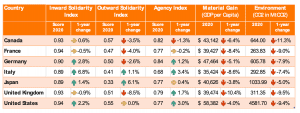People in the G7 countries have reacted very differently to the pandemic: For instance, Italians and Japanese have shown more solidarity both with their compatriots and with other countries, while the opposite is true for Canadians and French. These are remarkable results of the study “How Covid-19 changed the world” which the Brookings Institution has published. It was written by economist Dennis J. Snower and Katharina Lima de Miranda from the Kiel Institute for the World Economy, and is based on data of the Recoupling Dashboard, which the Global Solutions Initiative hosts.
Berlin/London/Washington D.C., 29th of April 2021 – While economies collapsed due to the shutdown of broad swathes of the economy, the state and civil society have gained new significance in protecting people from the pandemic’s effects, a new study finds. However, the reactions in G7 countries differ widely: In Italy, social prosperity has moved in surprisingly positive directions while in Canada and France the opposite can be observed. Societal indicators in Germany, Japan, the U.K., and the U.S. reacted ambiguously to the pandemic. These are core results of the working paper “How Covid-19 changed the world” published by the U.S. think tank Brookings Institution. It is based on the ongoing project “Recoupling Dashboard” which Prof. Dennis J. Snower, former President of the Kiel Institute for the World Economy (IfW) and founder of the Global Solutions Initiative think tank network, developed together with IfW researcher Dr. Katharina Lima de Miranda. Dennis Snower is also a fellow at Brookings.
The Recoupling Dashboard delivers a new way to measure the wellbeing of nations with four complementary indexes which together capture the complete range of societal prosperity: Solidarity (S), Agency (A), GDP (material Gain, G) and Environmental sustainability (E)—SAGE for short. Not surprisingly, GDP has decreased in all countries of the G7 due to the economic recession caused by Covid and there has been a corresponding drop in CO2 emissions – an indicator for Environmental sustainability. The differences among the G7 in response to the pandemic are evident in the solidarity and agency indexes.
The growth in inward solidarity within societies was particularly pronounced in Italy, Germany and the United States of America. This is a signal of the resilience of civil societies in providing social support networks where the economic ones had crumbled. Inward solidarity has not decreased in any of the G7 countries. On the other hand, the development of outward solidarity, or cohesion between nations, is a cause for concern. The respective index has decreased significantly in Great Britain, France and Canada, as well as Germany. This could be a sign of growing nationalism in those countries. “This is an alarming signal. A fall in outward solidarity may be expected to hinder voter support for multilateral efforts to eradicate the pandemic worldwide. If it is not possible to make outward solidarity a national interest and a priority, then we cannot overcome the pandemic and other lethal challenges to humanity like the climate crisis,” Dennis Snower warns. Only in Japan and in Italy has outward solidarity been rising, showing openness for more international cooperation in the respective societies.
People’s empowerment to take their fate into their own hands – the Agency Index– grew significantly in the United States and Italy and slightly increased in the U.K. and in Germany. A decline could only be observed in Canada. “The reason for this might be that people are asking themselves: How do I take care of myself and my family during the lockdown? How do I organize my life, my home office, homeschooling? Can I count on the support of relatives, neighbours, and my immediate environment? This makes them aware of their personal agency to influence their life,” Katharina Lima de Miranda assumes.
The study also shows rising trust in state institutions in response to the early pandemic in 2020. In Germany, 65 percent of the population expressed confidence in their national government, while this is only true for 35 percent of the citizens in the U.K. and 37 percent in Italy. However, this perception appears to have reversed course in 2021.
“Both civil society and states have grown stronger during the first phase of the pandemic. They can process and absorb external shocks – the market cannot,” states Snower. “Despite all criticism of government measures, it is institutions close to the government that regularly provide information and updates, decide on measures to combat the Covid-19 pandemic and provide support for those affected by the steps.”
The Recoupling Dashboard was first introduced in 2020 for G20 countries and is updated regularly. It incorporates two well-established indexes: GDP provided by the OEDC and CO2-emissions provided by Carbon Monitor/Caron Action Tracker. In addition, it has introduced two new indexes: The Solidarity Index is based on international survey data by the Gallup Institute. The Agency Index summarizes further survey data by the Gallup Institute as well as statistics from the World Bank.
The working paper “How Covid-19 changed the world” is available for free download at https://www.global-solutions-initiative.org/recoupling-dashboard-homepage/. It contains numerous data points for the G7 countries for 2020 and 2019 but also for 2010.

Sources: Solidarity and Agency are based on own calculations using data from the Gallup World Poll and the World Bank, GDP data was extracted from OECD National Accounts at a Glance, CO2 Emissions represent estimates from The Carbon Monitor. Since no data from the Carbon Monitor is available for Canada we use Greenhouse Gas emissions from Climate Action Tracker instead. This is not directly comparable to CO2 emissions from the other source but gives an indication of Canada’s reduction in GHG emissions in 2020.
Press Contact
Christoph Podewils, Director of Communications
+49-172-4497959
christoph.podewils@global-solutions-initiative.org
press@global-solutions-initiative.org
